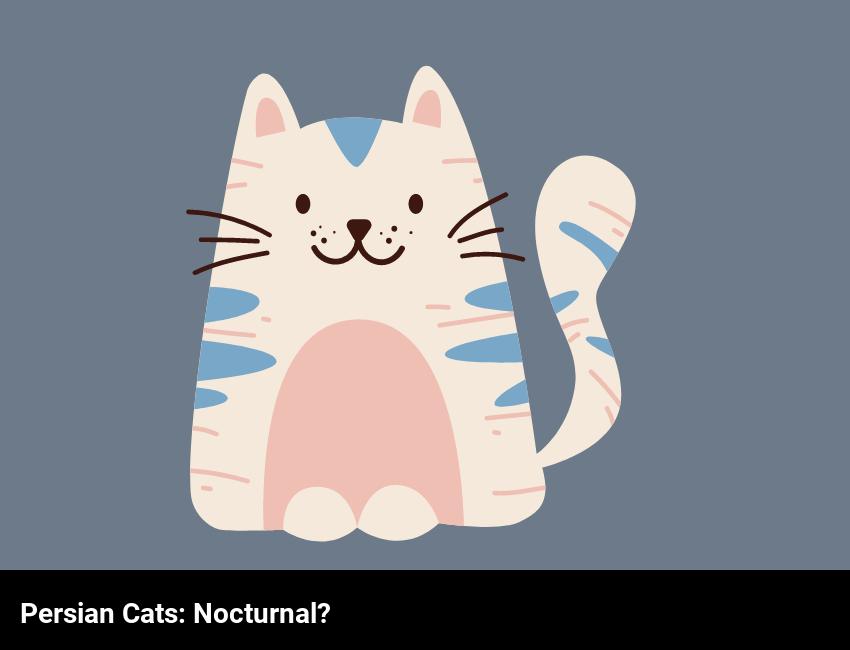Are Persian Cats Nocturnal?
No, Persian cats are not nocturnal. They are mostly active during the day and sleep during the night, like most other cats.
As the proud owner of a Persian cat, I often wonder what makes this breed so special. From their luxurious fur to their adorable facial features, it’s no wonder that Persian cats are one of the most popular cat breeds. But one question I have often pondered is: are Persian cats nocturnal?
I’ve heard many stories about cats being active during the night and this made me curious about what makes Persian cats different from other breeds. In this blog post, I will explore the concept of nocturnal behavior and how it relates to Persian cats. I’ll also discuss how much sleep Persian cats get, the benefits and risks of nocturnal activity, and how you can help your Persian cat adjust to a sleeping schedule.
What makes persian cats unique?
If you’re looking for a unique and lovable pet, look no further than the Persian cat! This breed is known for its long hair, gentle temperament, and big eyes that just melt your heart. But what really makes Persian cats special is their personality.
Persian cats are incredibly curious, always interested in what you’re up to and eager to explore their environment. They love to play and can be quite active, but also aren’t afraid to take a nap when it’s time. They are also quite social and enjoy being around people.
Another unique trait of the Persian cat is their calm and gentle nature. They rarely become aggressive and are very tolerant of being handled. They also don’t mind being around other cats or animals, making them great pets for families with other pets.
Lastly, Persian cats have a unique look that sets them apart from other breeds. They have long, luxurious coats, expressive eyes, and short, stocky bodies. They come in a variety of colors, so you’re sure to find one that’s just right for you.
To answer the main heading, “Are Persian cats nocturnal?”, the answer is no. Persian cats are not nocturnal, but they do enjoy playing and exploring at night. However, they are much more active during the day than at night.
Overall, Persian cats are one of a kind. Their personalities, temperament, and looks make them a beloved pet for cat lovers everywhere.
What is nocturnal behavior?
Are you wondering what nocturnal behavior is? Well, it’s simply when an animal is active mostly at night and sleeps during the day. Persian cats are no exception – they are also nocturnal creatures.
The Persian cats have adapted their behavior to the changing environment. During the day, when the sun is out, they will sleep and rest. At night time, however, when the temperature is more suitable for their coats, they will become more active and alert.
Nocturnal behavior in Persian cats is beneficial to the cats themselves. It helps them to stay out of harm’s way and to avoid predators. It also allows them to hunt for prey more easily in the dark. Persian cats are known to be excellent hunters, so it makes sense that they have adapted to nocturnal behavior.
Nocturnal behavior also helps Persian cats to conserve energy. During the night, they can explore, play, and hunt without having to expend too much energy. As a result, they can be more alert and ready to tackle the day when the sun comes up.
It’s important to keep in mind that Persian cats don’t necessarily have a strict nocturnal behavior. They may still be active during the day, especially if their owners are around.
How do persian cats sleep?
Are you wondering how Persian cats sleep? Well, the answer might surprise you! Persian cats are not nocturnal, and instead sleep in typical cat fashion, usually during the day, but with a few naps here and there throughout the day.
Although they don’t need as much sleep as some other breeds, they still require plenty of rest. It’s not uncommon to see a Persian cat snoozing away for hours at a time. This is why it’s important to give them a comfortable and safe place to sleep.
Unlike other cats, Persian cats tend to sleep in one spot for longer periods of time. Their beds should be placed in a quiet and dark area to ensure they get the best rest possible. If you have other pets, make sure to create a separate space for your Persian cat, as they can be easily disturbed by other animals.
Persian cats are also known for their love of cuddling and snuggling. When they finally do hop into bed, they’ll be sure to find the comfiest spot to curl up in and dream the night away. Persian cats love to sleep with a companion, so if you’re lucky enough to have one, you’ll get to enjoy some cozy cuddle time.
At the end of the day, Persian cats may not be nocturnal, but they sure do love their beauty sleep. With the right environment and a companion to cuddle with, they’ll be sure to get the restful sleep they deserve.
What are the benefits of nocturnal activity for persian cats?
You’ve heard that Persian cats are nocturnal and might be wondering what the benefits of their night-time activities are. Well, the good news is that there are plenty of good reasons why Persian cats love to stay up late! Here are some of the benefits of nocturnal activity for Persian cats:
- Increased Hunting Ability: Persian cats are naturally skilled hunters, but nocturnal activity allows them to hone their skills even further. By being active during the night, they can take advantage of the lack of light and increased availability of prey.
- Better Health: Nocturnal activity helps Persian cats stay physically fit and active. This makes them less prone to obesity and other illnesses related to inactivity.
- Increased Bonding: When Persian cats stay active late into the night, they have more opportunities to bond with their owners. Since they’re up late and don’t need to sleep as much, they can spend more time playing with their owners and cuddling.
- Reduced Stress: Persian cats that are active during the night often have lower stress levels than those who sleep all day. The extra activity helps them burn off excess energy and provides them with a sense of security and comfort.
Do persian cats sleep during the day?
Yes, Persian cats sleep during the day! Persian cats are active and playful during the day, but they also need their rest. Persian cats generally sleep up to 16 hours a day and can take short naps throughout the day.
This doesn’t mean that your Persian cat will sleep all day. In fact, they need lots of playtime and exercise to stay healthy and happy. They’ll love to socialize with you and play with toys, both of which will keep them active and alert.
When it comes to nighttime, Persian cats may become more active than during the day. However, Persian cats are not strictly nocturnal, meaning they don’t spend long hours awake at night.
If your Persian cat is not getting enough sleep during the day, it’s important to adjust their routine to make sure they’re getting enough rest. Set a regular bedtime for your Persian cat, and make sure the room is dark and quiet so they can get the sleep they need.
Persian cats need a good balance of playtime and rest to stay healthy and happy. So, be sure to give your Persian cat plenty of love and attention while they’re awake and make sure they get plenty of rest during the day.
How much sleep do persian cats get?
You may be wondering exactly how much sleep Persian cats get. The answer is, Persian cats sleep between 12 to 16 hours a day. That’s a lot of sleep! These cats have a reputation for being nocturnal but they usually stick to a regular sleep pattern.
Persian cats usually sleep for about half of the day. During the day, they often nap for a few hours at a time. At night, they may be more active but they also sleep soundly. This is why it’s important to give your Persian cat a comfortable place to sleep, so they can get as much restful sleep as possible.
Persian cats are also known for being very lazy, and they don’t really have much of an exercise routine. This means they don’t really need a lot of extra sleep during the day. However, they may sleep more if they’re feeling stressed, or if their environment is too noisy.
Although Persian cats can be active at night, they’re not actually nocturnal. They tend to stick to a regular sleep pattern, no matter what time it is. So if you’re worried about your Persian cat not getting enough sleep, don’t worry too much. As long as you provide them with a comfortable place to sleep, they’ll be well-rested.
Are there risks associated with persian cats being nocturnal?
Yes, there are risks associated with Persian cats being nocturnal. As with any pet, you should be aware of the risks and take precautionary steps to ensure your pet’s safety.
Firstly, Persian cats that are nocturnal have a higher chance of getting lost. This is especially true if they are allowed to leave the house at night, as they may become disoriented or be more easily attracted to a potential predator. Therefore, it is important to make sure that their access to the outdoors is blocked off at night.
Additionally, as cats are naturally crepuscular, they tend to be more active during twilight hours. This could mean that they will be more prone to getting into trouble during these hours, such as getting into fights with other cats or injuring themselves while exploring. To protect your Persian cat from such risks, you should make sure that they are safely contained when the sun sets.
Finally, Persian cats that are nocturnal may be more prone to health problems, as they tend to sleep less than non-nocturnal cats. This can cause them to become lethargic and can lead to weight gain, poor grooming, and even depression if left unchecked. To minimize these risks, make sure your Persian cat is getting enough rest by providing them with a comfortable, safe sleeping area and make sure that they are eating a healthy diet.
Overall, while Persian cats are nocturnal, there are risks associated with this habit. As an owner, you should be aware of these risks and take steps to ensure that your pet is safe and healthy.
How can you help your persian cat adjust to a sleeping schedule?
Yes, Persian cats are nocturnal, but this doesn’t mean you can’t help your Persian cat adjust to a regular sleeping schedule. With a bit of patience and understanding, you can help your Persian cat adjust to a more regular sleeping pattern. Here’s how:
- Establish a routine: Establishing a regular routine for your Persian cat helps create a sense of predictability and familiarity. Try to feed, play and exercise your cat at the same time each day.
- Provide a safe and comfortable sleeping space: Make sure your Persian cat has a safe and comfortable sleeping environment. Place your cat’s bed in a quiet, dark corner of your home, away from any drafts or loud noises.
- Give your Persian cat a nightlight: Install a nightlight in your cat’s sleeping area to provide some light and comfort.
- Avoid late-night play sessions: Avoid playing with your cat late at night or in the wee hours of the morning. This will help them understand that it’s time to sleep.
- Reward good behavior: If your Persian cat is sleeping during the night, reward them with treats or playtime. This encourages them to stick to the routine.
With a bit of patience, understanding and a consistent routine, you can help your Persian cat adjust to a regular sleeping schedule.

Frequently Asked Questions
What’s so special about persian cats?
Persian cats are known for their luxurious coats, gentle dispositions, and adorable faces. They’re also one of the most popular breeds of cat around the world. They have a quiet and docile nature, making them great companions. They’re also known for their intelligence and long lifespans, which can reach up to 15 years or more. They’re relatively low-maintenance cats, making them ideal pets for the busy lifestyle.
Are persian cats more active at night?
No, Persian cats are not more active at night. Although they may be more alert and awake during the nighttime hours, they do not sleep during the day and are usually as active during daylight hours as they are at night.
What can you do to help keep your persian cat healthy and well-rested?
You can help keep your Persian cat healthy by providing them with a balanced diet, making sure they get plenty of exercise, and providing a safe, comfortable place to rest. Make sure they have plenty of fresh water available, and provide daily brushing to help keep their coats healthy. Also, try to create a routine and stick to it, to ensure they get the appropriate amount of rest.







